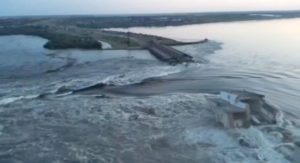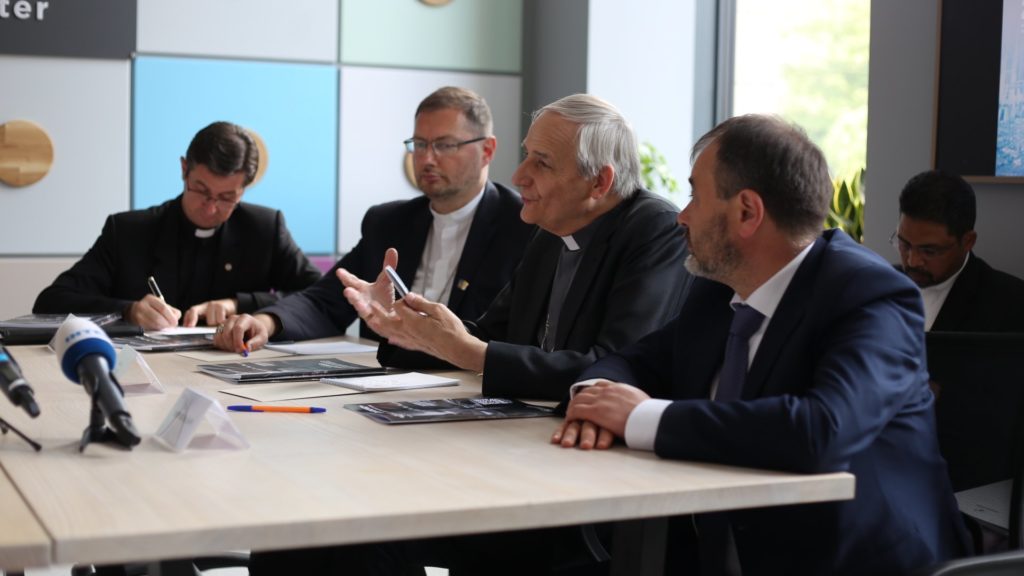Pope Francis' peace envoy to Ukraine, Cardinal Matteo Zuppi, was finishing his two-day visit to Ukraine June 6. He met President Volodymyr Zelenskyy amid breaking news of the destruction of a critical dam and hydroelectric power plant along the front lines in southern Ukraine that Zelenskyy blamed on "Russian terrorists." The Russian side accused Ukrainian forces of blowing up the dam. Ukraine accused Russians of committing what it called "ecocide."
Thousands of people are at risk from flood waters released from Kakhovka dam, only 20 miles from southeastern Ukraine city of Kherson, with Red Cross volunteers already prepared for evacuation trains carrying people whose towns are or will soon be underwater.
"My heart is broken. How can they hate life so much," Olia Hercules, a Ukrainian book author from Kakhovka, said in a Twitter video, accusing Russia of first damaging the ecosystem of the region by building the dam in 1956 on Stalin's order, and now "damaging it again" without warning by "blowing it up," the woman said.
Nova Kakhovka town, which is closest to the dam, was already completely flooded in the morning hours EST June 6. The damaged dam at the Dnipro River may cause the river itself to overflow, flooding coastal towns and cities. It may start an unprecedented ecological disaster in the region.
The head of the Ukrainian Catholic Church, Archbishop Sviatoslav Shevchuk, called on the world community to condemn Russia’s actions in Kakhovka and for allegedly blowing up the plant.
"Russia continues its genocidal aggression against Ukraine. The destruction of the Kakhovka hydroelectric power plant is another war crime, a terrible environmental and man-made disaster and a sin against God the Creator, who called man to foster, not destroy, the world he created," Archbishop Shevchuk said in a Facebook post.

"The explosion of the Kakhovka hydroelectric dam has put thousands of people in mortal danger, which is only growing. The rapid decline in the water level in the Kakhovka reservoir as a result of the explosion is a threat to the temporarily occupied Zaporizhzhia Nuclear Power Plant," he added.
Archbishop Shevchuk called for prayer for the people in danger and wisdom and courage for the rescue services evacuating civilians.
He called on the international community "to condemn these terrorist actions of the Russian aggressor and respond appropriately to them.”
In the meantime, Cardinal Zuppi, was visiting Kyiv, the capital of Ukraine, and met Zelenskyy June 6. Italian Avvenire Catholic newspaper reported that the meeting was cordial and that the papal envoy discussed with the president "key points to move into the direction of stable and concrete dialogue."
Zelenskyy said in a Telegram post that he "discussed the situation in Ukraine and humanitarian cooperation in the framework of the Ukrainian Peace Formula" with Cardinal Zuppi and added that "only united efforts, diplomatic isolation and pressure on Russia can influence the aggressor and bring a just peace to the Ukrainian land."
"I call on the Holy See to contribute to the implementation of the Ukrainian peace plan. Ukraine welcomes the readiness of other states and partners to find ways to peace, but since the war is on our territory, the algorithm for achieving peace can be Ukrainian only," Zelenskyy wrote.
According to the Vatican, the main purpose of the visit is to listen "in depth" to the Ukrainian authorities about possible ways to achieve a "just peace and to support gestures of humanity that will help ease tensions," read a June 5 Holy See communiqué.
Cardinal Matteo Zuppi is the archbishop of Bologna and president of the Italian bishops' conference. The Vatican announced May 20 that the pope had asked the cardinal to lead a mission to end the war, now entering into its 16th month.
On June 5, Cardinal Zuppi visited the Kyiv suburb of Bucha, the Kyiv regional military administration's press service said in a post on Telegram. The Kyiv region's governor, Ruslan Kravchenko, and local officials accompanied the cardinal during his trip to the region.
Kravchenko noted that this was the first visit by Pope Francis' peace envoy to Ukraine, during which he saw firsthand the "extremely high price" Ukrainians pay for freedom and peace around the world.
Representatives of the delegation visited the Church of St. Andrew the First-Called in Bucha. This is the place where 119 civilians were buried during the occupation.
After 33 days of occupation, Russian forces withdrew from Bucha in the first days of April 2022, leaving behind a scene of horror, with bodies lying on the ground, people shot with their hands tied at the back of their bodies, some found thrown into sewages.
"Such stories are a pain for the entire civilized world. The papal envoy spoke about the mass murders of civilians by the Nazis near the Italian city of Bologna. The Ukrainians, like no one else, want such terrible crimes against humanity to never happen again," Kravchenko said on June 5.
Cardinal Zuppi also held a meeting in Kyiv with Ukraine's parliamentary commissioner for human rights, Dmytro Lubinets. Archbishop Visvaldas Kulbokas, the papal nuncio to Ukraine, accompanied Cardinal Zuppi during the meeting.
The papal envoy emphasized that the war is a step backward that destroys everything and makes children suffer.
"It is unacceptable that the violence of this war has affected children. Pope Francis, speaking about Ukraine, used a very beautiful expression: 'Your tears are my tears, your pain is my pain,'" Cardinal Zuppi said during the meeting with Ukrainian officials in Kyiv on June 5. "And today I say that your children are our children -- I can talk about this because a lot of children came to Italy. It was very nice to see the hospitality with which the Italians received Ukrainian children," the cardinal said.
The cardinal noted that Italian and Ukrainian children in schools quickly found a common language and became friends.
Lubinets said that Ukraine was able to return 371 children from among those who were illegally deported to Russia during the war.
"The return of each child is like a small special operation. When you know that the Russian Federation will never support and help you, we must do everything to return Ukrainian children," the Ukrainian commissioner for human rights emphasized. "So far, we have managed to return 371 children. Perhaps with your participation," he told the cardinal, "we will be able to radically change this figure."
He emphasized that Ukraine is grateful to all those who are ready to help in this matter. Both parties also discussed the exchange of prisoners of war.
"Of course, the church will do everything possible to protect the lives of children," Zuppi said.
"Ukraine must liberate all its territory because it is the only mechanism for protecting children," Lubinets wrote on his Facebook post reporting on Cardinal Zuppi's visit to his office.
The damaging of the Kakhovka dam comes amid news that Ukrainian forces may have started a long-awaited counteroffensive in Eastern Ukraine, occupied by Russia.

